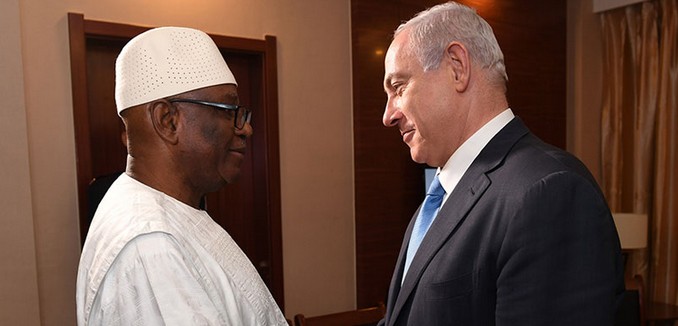Israeli Prime Minister Benjamin Netanyahu on Sunday met personally with ten African heads of state in Liberia, where he was the first non-African to deliver the keynote speech at the Economic Community of West African States (ECOWAS) summit.
Among the leaders Netanyahu met were Ghanaian President Nana Akufo-Addo and Mali President Ibrahim Boubacar Keita. While Mali is an Islamic nation that does not currently have diplomatic ties with Israel, both Netanyahu and Keita committed to improving the relationship between their two countries.
Prior to the ECOWAS summit, Netanyahu mended fences with the president of Senegal, whose decision to sponsor an anti-Israel United Nations Security Council resolution in December prompted Israel to withdraw from a number of joint projects. Israel will return its ambassador to Senegal and Senegal will back Israel’s efforts to become an observer at the African Union.
Israeli expertise in counter-terrorism, technology, and agriculture have led to a strengthening of ties with ECOWAS member states, Herb Keinon, diplomatic correspondent for The Jerusalem Post explained on Monday.
Keinon observed that while King Mohammed VI of Morocco chose to forego his nation’s campaign to join ECOWAS due to Netanyahu’s address, ECOWAS still chose to invite Netanyahu.
If you are the president of Liberia, which hosted Sunday’s conference, and you have rampant poverty, little electricity and huge challenges in everything from health to security, which country is a more important partner: Israel or Morocco? Over the years, Netanyahu has done a tremendous job marketing Israel’s technological prowess and convincing the world that it needs Israeli expertise in the fields of agriculture, water technology, cyber security and anti-terrorism. And it’s not a bluff. It’s real. Israel does have a tremendous amount to offer in these areas.
And it is because of all that Israel has to offer that much of Africa is excited and interested in ties.
Netanyahu focused on the potential benefits that cooperation with Israel can bring to ECOWAS nations and all of Africa during his keynote speech.
At the UN last year, I met with many African leaders. It was a spectacular visit, because young Israelis showed what they’re doing in Africa. Not what they will be doing, but what they are already doing. And one of the leaders said something that I’ll never forget. He said to me, “We have problems; you have solutions.”
A young woman there, a young Israeli technologist, comes to the podium and she shows how they’ve solved the problem of an African village, where a typical woman would go eight hours to get a gallon of water. And they solved it by making water out of thin air. And another showed how they make energy out of the sun, out of the air too. And another showed how they’re working to stop the spread of AIDs with miraculous results. In every field, in every field, our technology is there, it’s ready to work with you to provide solutions to some of the most pressing problems of Africa. We want to help your soil become more fertile, your water reusable, your cities safer, your air cleaner.
To successfully expand its diplomatic ties in Africa, Israel will have to increase the number of embassies and ambassadors it has on the continent, Keinon noted.
In a separate development, Israeli President Reuven Rivlin received Ethiopian Prime Minister Hailemariam Desalegn on Monday. Rivlin thanked Desalegn for attending the funeral of former president of Israel Shimon Peres last year, adding, “we are very anxious to get back to the connection that we have had with Africa, and we ask you to be our sponsors in Africa in order to let us be once again able to attend all the meetings and conferences of Africa.”
Desalegn responded, “the African Israel relationship truly is a gateway, we will do everything at our disposal to make the Israeli Africa relationship to grow and Ethiopia will take leadership in this regard. … We have a lot of desire to benefit from Israeli science and technology, and harness the potential, we can benefit from your support in this regard. We have to fight terrorism, extremism, climate change, which are common problems to all of us.”
Netanyahu embarked on a historic tour of East Africa in July and restored diplomatic ties with the Muslim-majority nation of Guinea. He also met with 15 African heads of state and ambassadors at the United Nations General Assembly in September. A separate group of African diplomats toured the Old City of Jerusalem in November.
“Israel is coming back to Africa; Africa is coming back to Israel,” Netanyahu said last March. “It’s happening in a big way. It’s happening now, but it should have happened a long time ago. It’s happening now because it’s so clear that this is good for Africa and it’s good for Israel. We face a multitude of challenges and opportunities.”
[Photo: Israel Ministry of Foreign Affairs]




